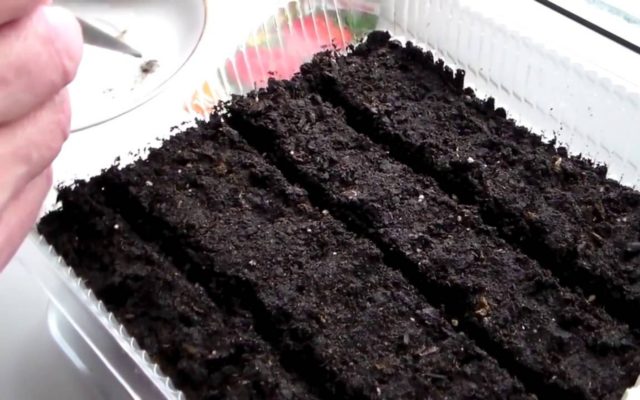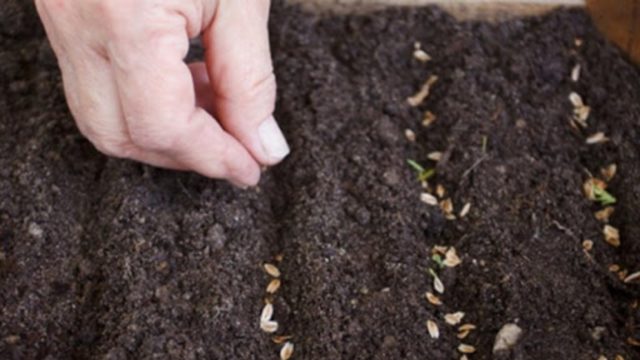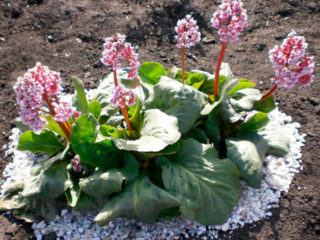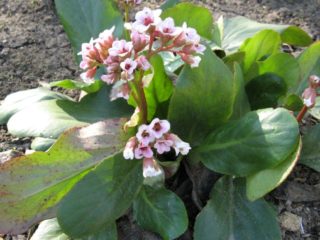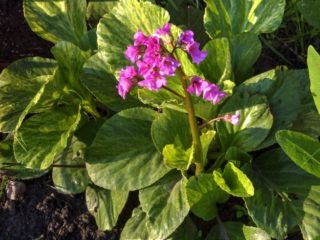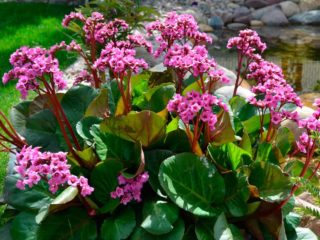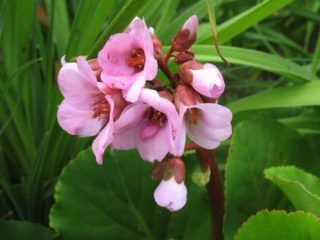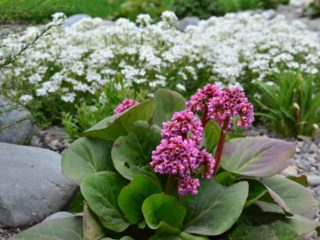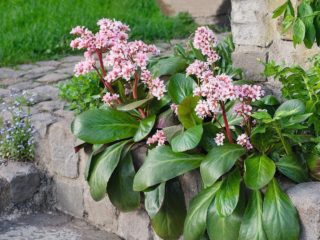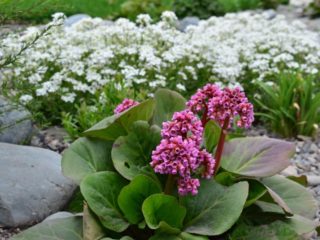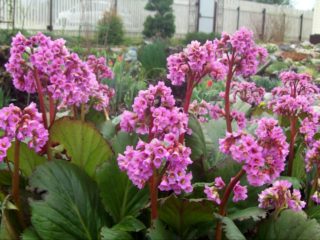Content
Badan Dragonfly Sakura is a hybrid form of culture, which is one of the novelties. The plant successfully combines high decorative qualities, increased resistance to adverse conditions and undemanding care. Despite the fact that the hybrid appeared relatively recently, it is widely used by landscape designers to create "living" perennial compositions, as well as in single plantings.
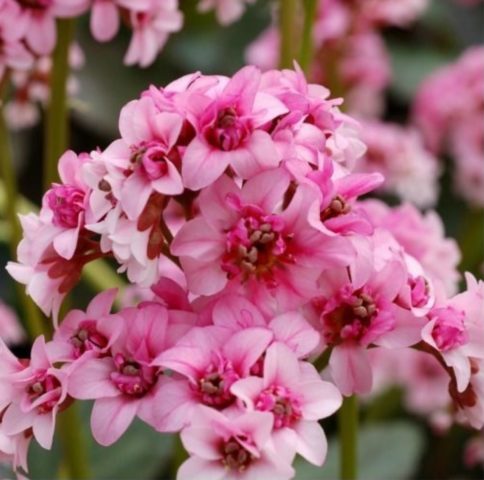
The hybrid was named for the similarity of flowers to the Japanese sakura.
Description
Badan Dragonfly Sakura is a herbaceous perennial. It has the shape of a shrub 45 cm high. Forms a powerful root system, consisting of thick brown shoots. It is located close to the soil surface and grows up to 40-60 cm in length.
Leaf plates of Badan Dragonfly Sakura are collected in a root rosette. They have a rich green hue, with a shiny surface, leathery to the touch. The shape of the plates is round. During cold autumn nights and early spring after the snow melts, the leaves of the badan Dragonfly Sakura acquire a rich crimson tint, which gives the plant a special sophistication.
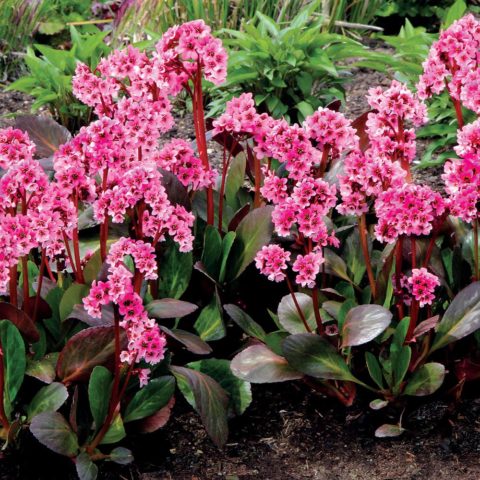
Badan leaves change color with an increased concentration of anthocyanin
The flowers of this hybrid are bright pink with a contrasting cherry eye in the center. Their diameter is 2.0-2.5 cm. They are collected in corymbose inflorescences. The height of the flower stalks in this species of badan reaches 40 cm, so they confidently rise above the foliage.
The flowering period of Badan Dragonfly Sakura begins in May-June, depending on the region of cultivation. Its duration is about a month, which is much longer than that of conventional types of culture. But even after the flower stalks wither, the bush retains its decorative effect, since at this time it actively grows foliage, and creates a sense of the volume of the plant.
Hybrid history
This hybrid appeared relatively recently in 2013. Its originator is the world famous American nursery Terra Nova Nurseries, which specializes in growing new species and varieties of plants. Work on the removal of semi-double berry was carried out for a long time, and as a result, they were crowned with success.
Growing seedlings
It is quite possible to grow seedlings of Badan Dragonfly Sakura at home. But in order for the venture to be successful, you need to acquire high-quality planting material that will correspond to the declared species.
For planting, it is necessary to prepare in advance wide containers, 8-10 cm high. They must have drainage holes to remove excess water. You also need to prepare a nutrient substrate. To do this, mix the following components:
- 2 parts of sod land;
- 1 part sand;
- 1 part peat;
- 1 part humus.
- 1 part coconut fiber
A day before planting, the soil should be spilled with a solution of the "Maxim" preparation, and then slightly dried. This will prevent the development of root rot at the initial stage of seedling growth.
Procedure:
- Place a 1 cm thick drain on the bottom of the container.
- Fill the rest of the volume with soil, water abundantly.
- When the moisture is absorbed, make small grooves 0.5 cm deep at a distance of 3 cm.
- Sprinkle seeds evenly into them.
- Sprinkle with earth on top, level slightly.
After that, cover the container with foil to create a greenhouse effect, and move it to a dark place with a temperature of + 18- + 19 degrees. In this mode, they should be before the emergence of friendly shoots. This usually happens 3-4 weeks after planting.
When sprouts appear, the container with incense must be rearranged on the windowsill, shading from exposure to direct sunlight.
When the seedlings get a little stronger, they need to be adapted to external conditions. To do this, remove the film from the container for the first time for half an hour, and then increase this interval by another 30 minutes. After a week, the seedlings can be fully opened.
When 2-4 true leaves appear, the plant must be planted in separate containers with a diameter of 7-8 cm. The substrate can be used the same as when planting seeds.
How and when to plant in open ground
You can plant seedlings of Badan Dragonfly Sakura at the end of May. By this time, the plants should have developed a strong root system and formed a small leaf rosette. But in order for a hybrid to fully develop, it needs to find the optimal place and provide the necessary care.
A place
Badan Dragonfly Sakura prefers moisture and breathable soil. At the same time, it shows a high decorative effect when planting in slightly alkaline and slightly acidic soil, since it is undemanding to the composition of the soil. For a plant, you should choose an area with light shading from hot midday rays, which will eliminate the likelihood of burns on the leaves.
When bergamo is placed in well-lit areas, the bushes become noticeably smaller, but there are more peduncles. In the case of planting a hybrid in deep shade, the leaves become larger, but at the expense of flowering.
The soil
2 weeks before transplanting into open ground, the site should be dug up and the roots of perennial weeds should be carefully removed. You should also add to the soil for each square. m. 5 kg of humus, 30 g of superphosphate and 15 g of potassium sulfate. After that, smooth the surface.

The site for planting must be prepared in advance
It is necessary to plant seedlings of badan Dragonfly Sakura in a permanent place in the evening or on a cloudy day. To do this, prepare holes 8 cm deep and water them abundantly. Plants need to be staggered at a distance of 40 cm from each other.
Badan transplant should be carried out with an earthen clod on the roots. Then sprinkle with earth on top and compact it at the base of the plant.
Fertilizers
Badan Dragonfly Sakura responds well to feeding. Therefore, you need to fertilize the plant several times per season. This will help increase the number of buds, prolong flowering, and improve leaf growth.
The first feeding should be carried out in the spring during the active build-up of green mass. During this period, you can use urea (30 g per 10 l of water) or chicken manure (1:15). The second time fertilization should be applied during bud formation, using 30 g of superphosphate and 15 g of potassium sulphide per bucket of water.
Watering
Badan Dragonfly Sakura needs to be watered correctly. This should be done during bud formation, flowering and 2 weeks after that. Watering should be carried out only in the absence of rain for a long time. The rest of the time, the plant can independently provide itself with moisture.
In the hot season, the soil at the base of the berry must be mulched with sawdust or crushed bark. This will protect the plant's root system from overheating and prevent excessive evaporation of moisture from the soil.
Pest control
Badan Dragonfly Sakura is highly resistant to pests.But if the growing conditions do not match, the plant may suffer from a weevil. It is quite difficult to deal with these insects at the stage of mass distribution. Therefore, the bushes should be treated annually in the spring, as a preventive measure, with Actellik or Confidor Extra.
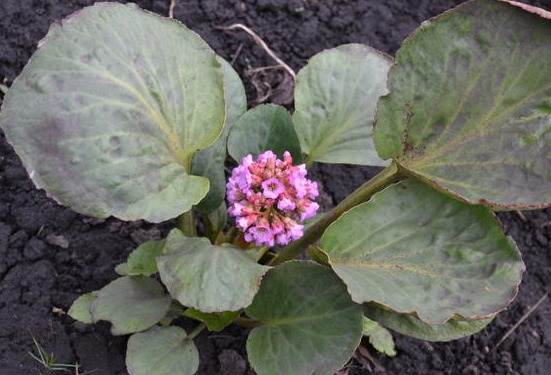
Timely processing helps prevent pest infestation
Diseases
Badan Dragonfly Sakura suffers from ramulariasis during prolonged rains. The disease can be recognized by brown spots on the upper surface of the leaves. And on the reverse side, on the affected areas, there is a white fungal bloom. With further progression, metabolic processes in plant tissues are disrupted. This leads to premature wilting of the leaves.
For treatment, it is necessary to carry out a comprehensive treatment of the bushes. Leaves need to be sprayed with Bordeaux mixture or Fundazol. You should also water the plant with the working solution of the "Maxim" preparation.
Pruning
Badan Dragonfly Sakura does not need pruning, since its leaves retain their decorative effect with the arrival of winter. The lifespan of each plate is 2 years. Therefore, the plant independently carries out the replacement of foliage. But in the process of growth, wilted peduncles, as well as damaged plates, can be removed.
Conclusion
Badan Dragonfly Sakura is a highly decorative hybrid variety that looks perfect both in single and group plantings. The unpretentiousness of the plant allows it to be planted even in places where other crops die. Thanks to this, the popularity of the hybrid is growing every year. And the similarity of its flowers with Japanese sakura only increases the demand for culture among flower growers.
